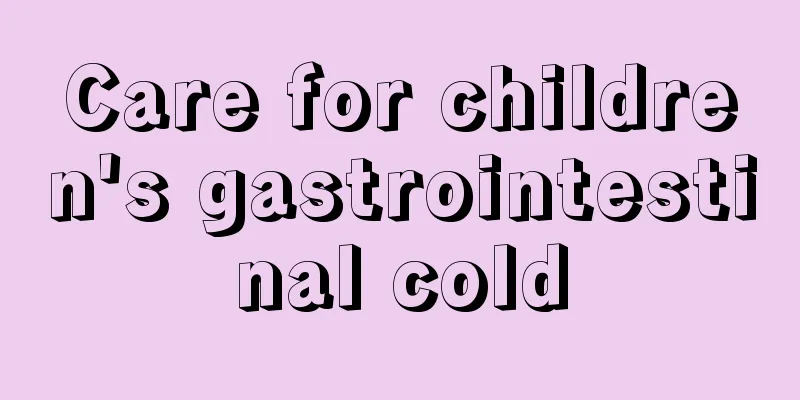Care for children's gastrointestinal cold

|
Gastrointestinal cold is a common cold in children. It has a serious impact on children's health. Therefore, many families need to provide all kinds of care for their children to recover as soon as possible after their children have a gastrointestinal cold. The following content provides a detailed introduction. Therefore, parents of children who often suffer from gastrointestinal cold can have a comprehensive understanding of the following content. 1. Home care for gastrointestinal colds is very important. Mothers should pay attention to keeping fresh air in the room and add or remove clothes for the baby in time when the climate changes. 2. If your baby sweats a lot after taking antipyretics, you should change the wet clothes in time after each sweating to avoid catching a cold again and worsening the condition. 3. During the fever period, give your baby more boiled water, eat easily digestible food with light taste, and avoid spicy, cold drinks, greasy, and fried foods. 4. It is normal for babies to have decreased appetite during illness. Moms should not be anxious, and should not force their children to eat. Giving the child's gastrointestinal tract some rest time will help the body recover as soon as possible. 5. If the baby's tongue is coated with yellow and there is a sour and smelly smell in the mouth, it indicates that there is food fire in the body. Mothers must control the intake of greasy food, and can give babies food-digesting pills and hawthorn pills to clear away heat and relieve stagnation. 6. Once the baby vomits, the mother should not panic. Let the baby lie on his side. For older babies, the baby can be placed in a prone position. This will help the vomit to flow out, keep the airway open, and avoid vomitus from being inhaled into the trachea, causing suffocation and endangering life. 7. Babies with a fever of 38.5℃ or above or with a history of febrile convulsions must take antipyretics in time or adopt physical cooling measures to prevent febrile convulsions. 8. If a family member or childcare institution has a cold, it is best not to have close contact with children. If isolation is not possible, you should wear a mask to avoid infecting your children. Do not rush to send your child to kindergarten until you have fully recovered from the illness to protect other children. The above content provides a detailed introduction to the care of children with gastrointestinal colds. Therefore, for many parents, when their children have gastrointestinal colds, in order to help them recover as soon as possible, they must understand a comprehensive introduction and care, and then provide better care so that their children can recover as soon as possible. |
<<: Symptoms of acute gastroenteritis in children
>>: What complementary foods are available for babies aged 6 and a half months?
Recommend
What to do if your child has bloating? Abdominal massage
Many babies experience bloating after meals due t...
What to do if your newborn doesn't sleep
Newborns sleep much more than adults, and there a...
Baby's head moves from side to side while sleeping
Normal adults usually sleep still, but this canno...
What to do if a newborn has pyloric stenosis and vomiting
The incidence of pyloric stenosis is more concent...
Why is the child's hair yellow?
Generally speaking, our hair should be black, but...
Is it OK for a baby boy to have his hands cut off?
The lines on babies' palms are different. Acc...
What to do if your six-month-old baby's belly button is red
A baby is the hope of a family, so after the baby...
What are the benefits of children learning dance?
Nowadays, many parents pay special attention to t...
Why is there blue around the baby's nose?
The birth of a baby is the happiest and most joyf...
How to treat chronic pharyngitis in children?
Children's bodies do not have as strong an im...
What should I do if my baby has phlegm in his throat?
The main reason why the baby has phlegm in his th...
Why does my 3-month-old baby sweat on his palms?
The health of the baby is extremely important to ...
What to do if your baby gets hot while sleeping in summer
Everyone knows that the weather in summer is very...
What to do if your child has internal heat and fever
For children, they often do not pay attention to ...
How often do babies eat formula?
Newborns will only be fed with breast milk after ...









